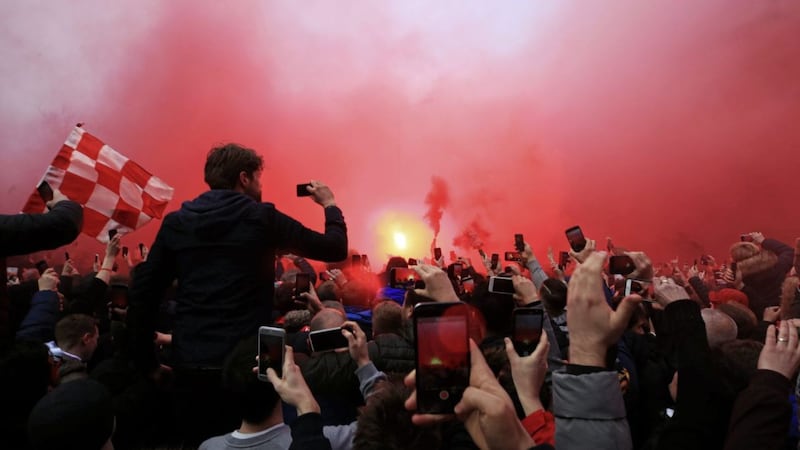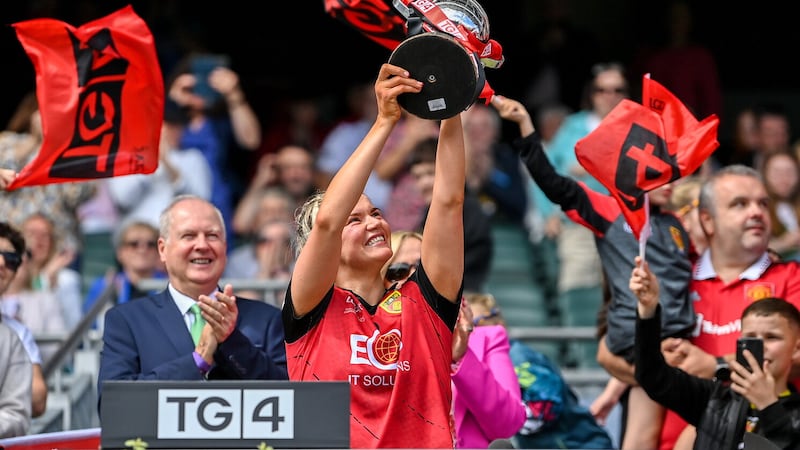IF you’re peering into the world of sport looking for moral guidance, you’d maybe be better turning your heel at the door.
Even before money’s claws were sunk in and started to pull things further south, the compass never worked particularly well.
Sport has never been immune to society’s ills, and rarely been strong enough to take the lead on dealing with them.
There were exceptions but you think of the like of Tommie Smith and John Carlos, who were individuals that took a huge personal risk to make a statement that was really only founded in basic human decency.
Sport has the power to change society, yet it so rarely has an impact.
And far too often, particularly when it comes to racism, football in particular feeds the idea that it is acceptable. Good work has been done in small parts but when it comes to decisive action, power acts feebly.
Fines and warnings and closing off sections of stadiums, that’s it.
There’s still a culture where Porto striker Moussa Marega tried to walk off after being racially abused by opposition fans in February, and his own team-mates tried to stop him.
That feeds the idea that the man taking the abuse is somehow to blame. There’s no deterrent for abusers, or the teams they follow.
The reason there’s no deterrent is because the authorities are terrified that it will cost them money.
If they ban clubs or put lengthy stadium bans in place, they stop the flow of income. And as we’re seeing now, the hand-to-mouth way in which sport exists means an eternal tightrope walk.
Finance matters now far more than the games.
What else could possibly explain a playoff to get out of the second tier of English soccer being described as one of the most important football matches anywhere in the world?
It was what it was, until it the Premier League’s mega-millions were at stake.
As in society, so it is in sport.
The rich get richer, the poor get poorer.
So it should be no surprise when sport lets you down.
Liverpool FC have been the closest thing to moral guardians that English soccer has had in the professional era.
Sure, they’re a money-making force themselves, but they did a lot of things the right way.
Their support for the victims of Hillsborough, right down to banning The Sun newspaper, reflects their people. Jurgen Klopp has impressed for the way that he has come to characterise the club and the city.
At the last general election, Liverpool’s five constituencies all returned Labour candidates. Only one Tory candidate polled more than 10 per cent. It will be a cold day in hell before the city moves on from everything that happened on Thatcher’s watch.
The city still has one of the highest unemployment rates in the UK.
With a world of debt being taken on by the government through the furloughing scheme, the last thing it needs is multi-million-pound-profit-making monsters like the local football club pulling up a hood and seeing if they can bog the hand in too.
It was a most un-Liverpool thing to do. It was a terrible decision. And make no mistake, if it hadn’t proven such a colossal PR disaster, the rest would almost certainly have followed suit.
Yesterday's decision to reverse it is only about saving face and nothing else.
The primary objective of a professional sporting club is no longer to entertain.
It’s not even to win.
It is to make money for the owners.
Liverpool, Tottenham and the rest made the call they did because they could. It would save them money. That’s all that mattered.
Will professional sport alter as greatly as some are suggesting when the dust settles?
You would assume there will be greater caution exercised, that larger cash reserves will become essential in case of future emergencies.
But you’d have thought the same after the last global financial crash. No sooner does austerity kick in than things start to climb. Once confidence returns after a few years, the past is forgotten and the money starts to get fired around again.
In some ways, seeing how other sports have dealt with the difficulties of the past few weeks has made it easier to appreciate the GAA’s amateurism.
The inter-county game has been playing Jenga with it, pulling a block out here and another there, but the structure remains standing for now.
It’s not immune to money, far from it, but there is comfort in the fact that the entire sporting world could collapse over the next two months and we’d be about the only ones left standing.
There’s ease in the fact that we know for sure now we could never sustain professionalism anyway.
We only need to look at the chaos our antipodean cousins are facing in the AFL, and the fact that they’re operating with four times as many chimney pots, as Jim McGuinness once put it.
The only certainties in professional sport now are that it will find a way to let you down, and that tribalism will take over among fans when you’ve to start defending your own patch.
Everyone protects their own, and that’s cause to stay until the furore dies down and everyone forgets.
What Liverpool did last week will have absolutely no impact on the club.
Nobody takes up a moral crusade against their own.
Whatever handful might tear up season tickets are easily replaced.
An individual supporter needs their club far more than the club needs them.
They just go on, as if history never happened.
The wheels of professional sport keep turning and the cash keeps rolling in.
Please God we never go that way.







